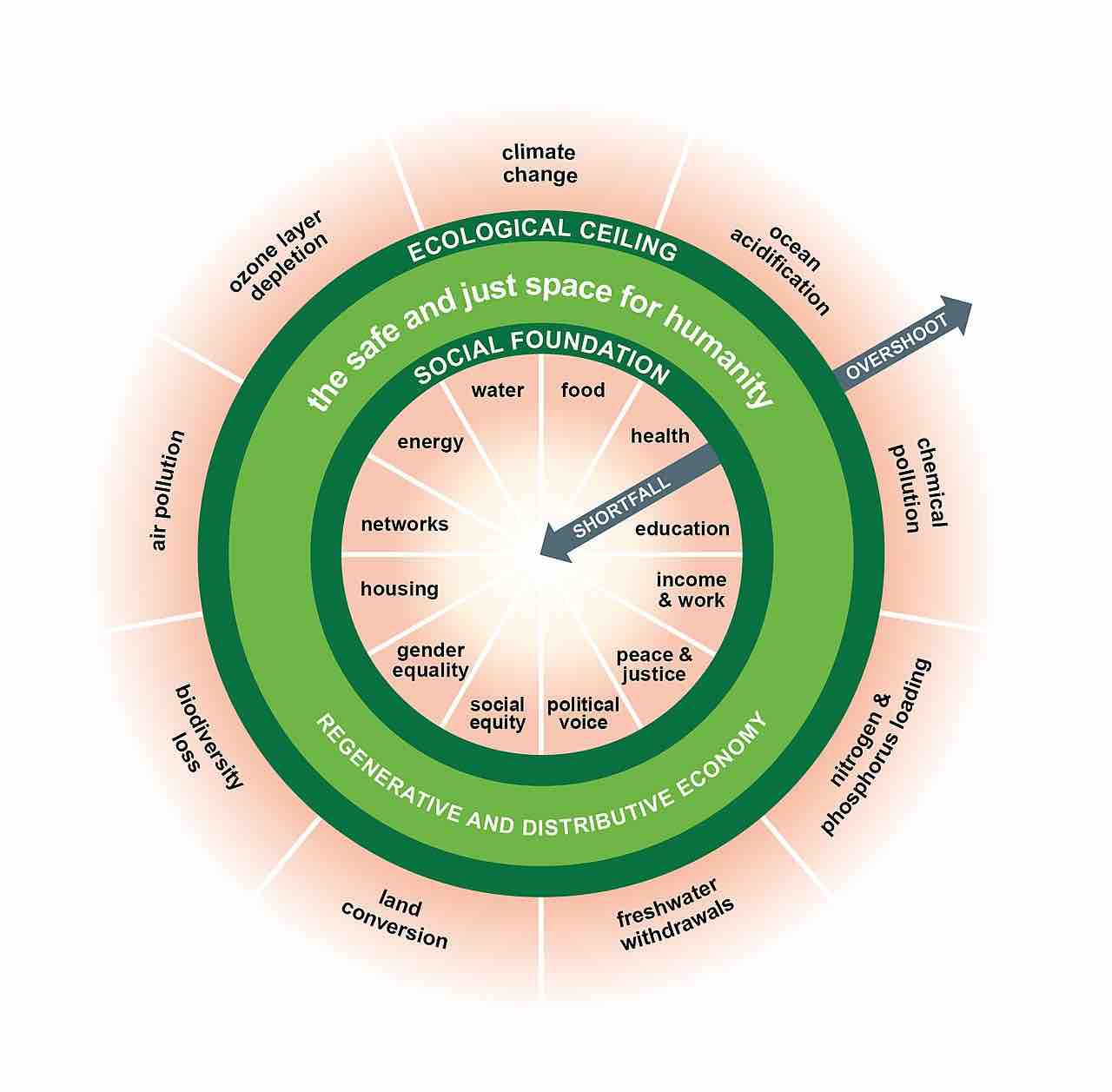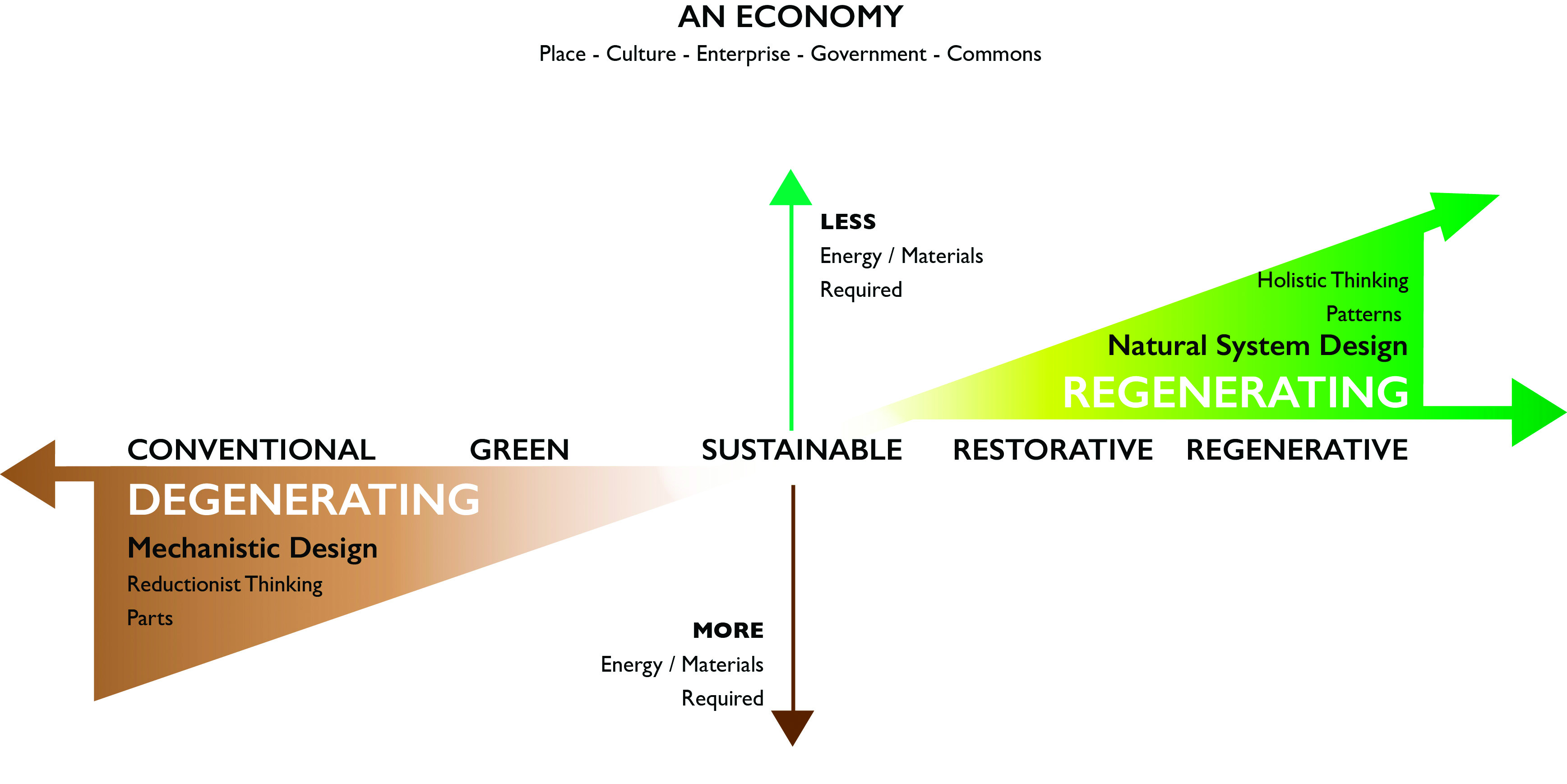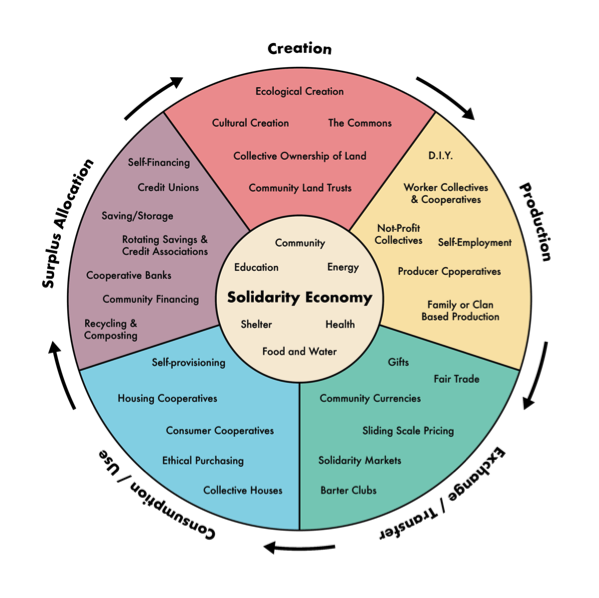Economies - New earth practise
prevent, financial crises that have shaken the foundations of our societies. Its outdated theories have permitted a world in which extreme poverty persists while the wealth of the super-rich grows year on year. And its blind spots have led to policies that are degrading the living world on a
scale that threatens all of our futures.Anne
'Degrowth signifies a society with a smaller metabolism, but more importantly, a society with a metabolism which has a different structure and serves new functions. Degrowth does not call for doing less of the same. The objective is not to make an elephant leaner, but to turn an elephant into a snail. In a degrowth society everything will be different: different activities, different forms and uses of energy, different relations, different gender roles, different allocations of time between paid and non-paid work, different relations with the non-human world.’
'The degrowth imaginary centres around the reproductive economy of care, and the reclaiming of old – and the creation of new – commons. Caring in common is embodied in new forms of living and producing, such as eco-communities and cooperatives and can be supported by new government institutions, such as work-sharing or a basic and maximum income, institutions which can liberate time from paid work and make it available for unpaid communal and caring activities’
Two definitions written in the book: ‘Degrowth: A Vocabulary for a New Era’ - chapter 2. Degrowth today (starting at page 72) Download book
Nowadays we use the GDP as a tool for measuring growth. The costs of growth include bad psychological health, long working hours, congestion and pollution. To grow the GDP we want to produce more products.
The results of a growing economy based on GDP:
- How more the economy in western world grow how lower the economy in the underdeveloped territories will be. This because the energy and the materials that extracted from commodity frontiers are often in underdeveloped territories that suffer the impacts of extraction. The people that are leders of factories are al in competition to each other to get company’s to use their factories. Because of that the hourly rate of the working people is getting lower and lower. Products are getting cheaper so the consumption will grow.
- Companies deliberately choose to produce and sell products that have a shorter lifespan so that consumers have to buy a new product more often because it breaks. For producing more product we need more materials and throw away a lot of stuff. This is all bad for the environment.
But does economic growth increase happiness? No. It is never enough everybody wants to have more than their neighbors. Countries feel pressured to compete, to follow the path of western overdevelopment with economic growth. This all because money gives you a feeling of power.
Article by John Cassidy : Can we have prosperity without growth? The critique of economic growth, once a fringe position, is gaining widespread attention in the face of the climate crisis.
In stead of measuring growth coupled to GDP some economists are working on more relevant and alternative such as the Human Development Index (HDI), the ecological footprint or the social health index. Some sectors, such as education medical care, or renewable energy, will flourish in the future, while others, such as dirty industries or the financial sector shrink. The result will be ‘degrowth’.
The results of degrowth:
- Sharing, simplicity, sociability, care and equality are significations of what this society might look like.
- Degrowth in the North will liberate ecological space for growth in the South. This because degrowth in the North will make natural resources and industrial goods more accessible to the developing South. As Kate Raworth is saying with the concept of the doughnut economy, ’By regenerative and distributive design we can make sure that healthcare, education, political voice, finance, energy reaches and empower the people who need it the most.’
In order to achieve degrowth we need to come up with new laws, higher/ different taxes.
- More taxes for companies that produce in an unsustainable way (not recycled materials, products that do not last long etc.) and subsidies for companies who do (recycled materials, products that do last long etc.).
- Maximum income for individuals but also company’s. High incomes are essentially wasted so far as wellbeing is concerned. A maximum income will avoid wasteful consumption and create more egalitarian societies. The tax procured from the maximum income could be used to fund universal basic services and basic income.
- Laws for longer guarantees period, the right to repair, for take-back systems, and protect the public space from advertisements telling us to buy more and more - both offline and online.
Our economic system needs to change to a sharing economy, introducing:
- Universal basic income would liberate people: perhaps a minimum of €1,000 a month, given unconditionally as a cash grant, or through the tax system as a negative income tax. This gives people the opportunity to choose a useful job they like in stead of choosing a job for security and high income. A basic income ensures that wealth can be distributed across a societyArguments for and against universal basic income
- Universal basic services that guaranteed public coverage of housing, education, health care, transportation, communication devices, etc. As example in England you have the NHS (National Health Service) that provides all people in England primarily and secondary health care. Country’s as Scandinavia and Germany provide free education. This is financed by the national taxes. Why do we not use this concept in different parts of our society that have an effect on poverty and life changes for people across our society?
- Reduction of working hours. In a shrinking capitalist economy, fewer people are necessary to produce declining levels of production which leads to reductions in working-hours. The result will be unemployment. With intentional degrowth, work has to be shared by voluntary trading of income for time, through four-day workweeks, permanent part-time (with benefits and career ladders) and job sharing. Another option is to reduce the length of working lives by earlier or phased retirement.
In august there will be the 8th international degrowth conference for Ecological Sustainability and Social Equity. The conference will encourage the participation of artists, practitioners and policymakers, taking place over five days at and around the International Institute of Social Studies (ISS) in The Hague. This conference focuses on ‘community’. The idea here is to explore, develop and share information on how communities respond to economic and ecological changes and how they organize for well-being in efforts to move out of situations of inequality and exclusion.
Jorick
See also: Oppression and Marginalized Voices
Regenerative economy is a way of thinking about our economic systems based around the goal of having an economy that fully regenerates any resources it uses and repairs previously done damage to the ecosystem.
For inspiration thinkers around the concept of the regenerative economy look towards the earth’s ecosystem, the largest fully regenerative system we know.1 Much like the earth, thinkers theorize, the economy should be seen as one whole system that cannot solely be analyzed as a product of its individual parts. Therefore, change cannot happen in just one facet of the economy. The solution to our current climate crisis can only arise by reimagining our entire economy to be fairer as a whole. A lot of these principles can be found in the Green New Deal, a sweeping package of proposed US legislation that aims to take on the country’s inequality as well as the current climate crisis by utilizing a transition to renewable energy and reparative works on the environment as an opportunity to provide fulfilling, well-rewarded work for all.2
The regenerative economy is significantly different from the circular or blue economy, in that these concepts stop at adapting our current economy’s means of production, whereas the regenerative economy acknowledges that our entire economic system needs to be reimagined.3 Where other visions on future economies strive to do no harm to our environment, the regenerative economy includes an element of healing and restoring our ecosystem, leaving it in a better state than we found it.
Other definitions:
John Fullerton, founder of the Capital Institute: We can and must use the universal patterns and principles the cosmos uses to build stable, healthy and sustainable systems in our design of the economy. When doing this, we need to change our view of what the economy really is, and adapt our assumptions about what a healthy economy looks like.4
"Economic vigor is a product of human and societal vitality, rooted in ecological health and the inclusive development of human capabilities and potential."5
By changing the assumptions we have about what economic success means, most notably that it can’t be defined solely by GDP growth, Fullerton radically changes our economic goals. By his definition, our economy should support the success of the ecosystems we are part of, which would be inseparably linked to human, economic and financial health.
Daniel Christian Wahl, the author of Designing Regenerative Cultures6, observes a need to rethink our definition of wealth and the role of transactions in the economy. By just defining wealth in monetary terms, he states, we miss out on the fact that by restoring the health of our ecosystems and communities we are creating wealth for all. Transactions are a necessity for any economy, but instead of simple transactions of commodities for money, Wahl reimagines the material flows of the regenerative economy as the “metabolic systems found in resilient living systems.” In this system, waste doesn’t exist. Instead, the rear-end of one process is merely the front-end of the next. As Wahl states, the first concrete steps towards a fairer system can already be taken: the flow of capital should be moved to the real economy and away from the speculative economy, where it serves no real life purpose except to multiply itself. Also, monetary flows should be shifted away from destructive and exploitative enterprises towards regenerative ones.7
Citation:
1Daniel Christian Wahl, “Redesigning Economics Based on Ecology,” July 6, 2020, https://blog.usejournal.com/redesigning-economics-based-on-ecology-35a82f751f25.
2Alexandria Ocasio-Cortez and Avi Lewis, “A Message From the Future With Alexandria Ocasio-Cortez,” April 17, 2019, https://www.youtube.com/watch?v=d9uTH0iprVQ.
3Daniel Christian Wahl, “Towards a Regenerative Economy,” Medium (Age of Awareness, April 9, 2020), https://medium.com/age-of-awareness/towards-a-regenerative-economy-bf1c2ed6f792.
4John Fullerton, Regenerative Capitalism (Capital Institute, 2015), 8, https://capitalinstitute.org/wp-content/uploads/2015/04/2015-Regenerative-Capitalism-4-20-15-final.pdf.
5Ibid., 40.
6Daniel Christian Wahl, Designing Regenerative Cultures (Axminster: Triarchy Press, 2017).
7Daniel Christian Wahl, “Towards a Regenerative Economy.”
Julia
What are the limitations of existing coop models? how could they be overcome? Peer to Peer Manifesto. Platform Cooperativism. See Commons folder for more!
What is cooperative and solidarity economy?
Solidarity economy is a form of production, consumption and distribution of resources that focuses on people, and not on the accumulation of capital. Today’s economy doesn’t really care about people. Inequalities and division are more visible. As a result, many people can’t have access to housing, education or health services. Social and solidarity economy puts people before profits. It invests in people’s creativity and capacities, creating quality jobs as well as prioritizing social objectives. This way people in marginalized groups can feel more empowered and feel included in their jobs.1 The video below from Caritas Europe explains a bit more about social economy and putting people before profits. 2
The contemporary use of the term Solidarity economy appears to have emerged in both France and South America in the early 1980s. European concepts of solidarity economy emerged from a long tradition of ‘social economy’, activism and policy, oriented toward addressing social and economic exclusion.
The concept stems from the world of cooperatives. It wants to give groups democratic control over economic processes. Labor is not seen as a production factor, but as a process in which a person can free and develop himself. And economics is not seen as a separate process, but viewed within a lot of dimensions such as social, political, ecological and the cultural. The solidarity economy seeks to nurture these values, as opposed to individualistic, competitive values, divisiveness of racism, classism, and sexism that characterize capitalism. With this, the solidarity economy also moves on the public area, in which it strives for a more just society.3,4
The solidarity economy exists in all sectors of the economy5.Non-monetized activities that are often motivated by solidarity, such as care labor and community nurturing are part of the solidarity economy. A lot of cooperative and grassroot economic initiatives already exist, often hidden or marginalized by the dominant economy. Examples of this are: worker, consumer and producer cooperatives; fair trade initiatives; community-run social centers; community development; credit unions; community gardens; open source free software initiatives; community supported agriculture programs and more.
An example of one of these more traditional coop types is The Co-operative College. This is an educational charity in Manchester which is dedicated to the promotion of co-operative values, ideas and principles within co-operatives, communities and society. It’s core values are Self-help, Self-responsibility, Democracy, Equality, Equity and Solidarity. This charity wants to empower and inspire individuals and communities to build a fairer world. It for helps people improve their lives, creating sustainable, fair and equitable communities.6
Ethan Miller in papers and reports from the U.S. Social Forum 2007:
“ While incredibly diverse, these initiatives share a broad set of values that stand in bold contrast to those of the dominant economy. - The core idea is simple: alternatives are everywhere and our task is to identify them and connect them in ways that build a coherent and powerful social movement for another economy . In this way, solidarity economy is not so much a model of economic organization as it is a process of economic organizing ; it is not a vision , but an active process of collective visioning” 7
A subset of solidarity economy is a commons-based peer production. This production contains a model of socio-economic production in which large numbers of people work cooperatively, often over the internet. This way, contributors of such a peer to peer production van create shared value through open contributory systems. Commons-based projects have less hierarchical structures than traditional business models and organizes labor relations differently than most traditional productions. The term is often used interchangeably with the term social production.8
My definition
In my view, cooperative and solidarity economy cares mostly for putting people before profit. It looks at what an individual can mean for a bigger cause. I think cooperative and solidarity economy is an interesting way of thinking about the economy that opens up spaces of possibility for a more just, sustainable and democratic economy. Also, the fact that this type of economy exists in all sectors of economy is interesting. The fact that this Peer production can be innovative within the context of capitalist competition is one of the reasons why this type of economy can really grow into a more dominant position in the current economy.
A downside of this type of economy might be that it is very dependent on these smaller movements and people. There might be initiatives that share similar values of a solidarity economy, but identify with different terms like a ‘local living economy’ of ‘social economy’. It can be hard to effectively link up different cooperatives into federative structures to build a broader solidarity economy. Maybe a platform for these initiatives to recognize each other's values in each other would be a way to overcome this problem.
Enspiral is a more concrete example of solidarity economy. What Enspiral does differently, is to work independently on projects, but to pool their profit to protect every member’s livelihoods. It is a virtual and physical network of companies and professionals brought together by a set of shared values and a passion for positive social impact. It’s sort of a “DIY” social enterprise support network. At its heart, it’s a group of people who want to co-create an encouraging, diverse community of people trying to make a difference.9
Something that makes me think is the independence you need for these types of organizations in order to work. Enspiral, for example tries to maximize both collaboration and autonomy, so everyone who joins needs to find your own way. There’s less official support, which might be hard for some people. This reminds me of the concept of commons: A shared responsibility and collaboration is needed in order for this to work. See the commons folder for more!
Citation
- Be.solidarityeconomy.eu. 2015. From http://be.solidarityeconomy.eu/
- Social Economy: Putting people before profits benefits everyone. 2017, 31 maart. From https://www.youtube.com/watch?v=W-g_3Hzb7ec
- Dirnbach, E. (2020, 26 juni). What role do cooperatives and the “solidarity economy” play in class struggle? From https://organizing.work/2019/07/what-role-do-cooperatives-and-the-solidarity-economy-play-in-class-struggle/
- Cooperatives. 2017, 19 juni. From https://proutglobe.org/prout/socio-economics/economics/economic-democracy/cooperatives/
- Seven ways to build the solidarity economy. 2018, september 4th . From https://www.opendemocracy.net/en/transformation/seven-ways-to-build-solidarity-economy/
- International Development. 2017, 19 juni. From https://www.co-op.ac.uk/Pages/Category/international
- Solidarity economy: building alternatives for people and planet ; papers and reports from the U.S. Social Forum 2007 – Allard, Davidson, & Matthaei – ChangeMaker Publications – 2008
- Commons-Based Peer Production - P2P Foundation. 2019, august 5th). From: https://wiki.p2pfoundation.net/Commons-Based_Peer_Production
- E. 2020. About Enspiral. From https://enspiral.com/pages/about
More interesting references
- Bauwens, M., Kostakis, V., & Pazaitis, A. (z.d.). Peer to Peer: The Commons Manifesto (Critical, Digital and Social Media Studies) (Illustrated edition). London, England: University of Westminster Press.
- What if the common good was the goal of the economy? | Christian Felber | TEDxVienna
Links
CONTRIBUTE
Feel free to contribute to Beyond Social.











